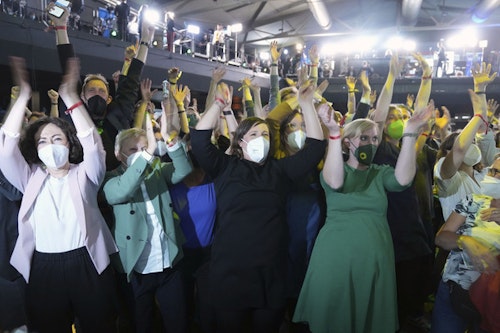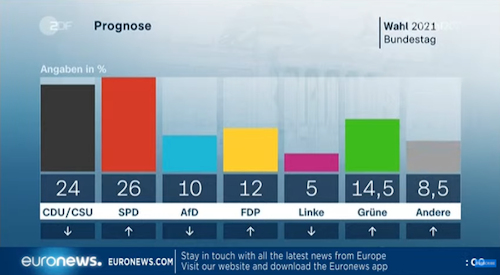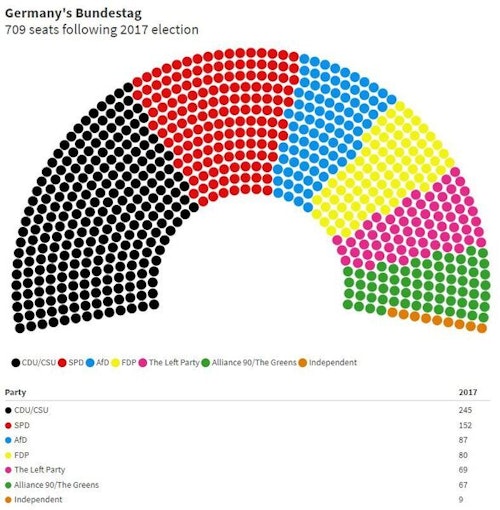Germans voted for members of parliament in an tight election race that will determine who succeeds Angela Merkel.
Germany's centre-left Social Democrats, in an election race that was at times too-close-to-call, edged in front of Angela Merkel's centre-right Christian Democratic Union bloc, who had a disappointing night, preliminary results show.
 ADVERTISEMENT
ADVERTISEMENT
 ADVERTISEMENT
ADVERTISEMENT
Scroll through our coverage of election night below to see how events unfolded.
Read also our latest German election updates and five takeaways from the pivotal vote.

 ${title}
${title}
Live ended
Summary
- The centre-left Social Democratic Party (SPD) is currently slightly ahead of the centre-right Christian Democratic Union (CDU), according to the most recent exit polls.
- Angela Merkel's CDU/CSU bloc was nonetheless likely to lose more than 45 seats in the Bundestag.
- The Greens are to significantly increase their representation in parliament, exit polls showed, while the far-right Alternative for Germany (AfD) and far-left Die Linke decreased their vote share.
- Chancellor candidates Armin Laschet (CDU) and Olaf Scholz (SPD) both said their party wished to form a coalition.
- "We had hoped for more, but it's still a good election result," Greens MEP Rasmus Andresen told Euronews
Germany's two main parties remain in a tight race, while the AfD and Die Linke are set to lose seats.
Germany's nail-biting election remains too close to call, although the party that wins won't necessarily be in the governing coalition.
Here are five takeaways from the exciting election.

'We had hoped for more', Greens MEP Rasmus Andresen tells Euronews
"We had hoped for more, but it's still a good election result," Greens MEP Rasmus Andresen told Euronews from an election event in Kiel, Germany.
The Greens are estimated to greatly increase their score from the 2017 elections, with exit polls showing them winning about 14% of the vote, but recent polls had the Greens 1-2 points higher. Earlier in the year, the party was polling at a high 26%.
Three parties will likely be necessary in order to build a coalition for the first time, the exit polls show, meaning the Greens will not be able to be in a coalition with only the Social Democrats.
"It's clear that we will just enter in the coalition with if a new government would be a climate government. This is what we campaigned for and what our voters are expecting. So this is the most important issue to come up with a climate agreement, a green deal for Germany, let's call it like this, to ensure that the Paris goals," Andresen said.
AfD likely to lose seats in Bundestag, but exit polls show them still in double digits
The far-left Die Linke party was also set to lose seats, with exit polls showing the party at around 5%, down from 9% in the 2017 elections.
Rafael Loss at the European Council on Foreign Relations said the poor showing for both parties was mostly due to the centralised campaign around the centre-left Social Democrats, the centre-right Christian Democratic Union bloc, and the Green Party.
"The three-way race between Olaf Scholz, Armin Laschet and Annalena Baerbock led to a consolidation of the political centre at the expense of the far left and the far right parties. Both the AfD and Die Linke are also being plagued by infighting over personnel and programmatic priorities," Loss said.
"Worryingly, there is a segment of the German population who now openly supports extreme-right politics – a majority even in some eastern states," he added of AfD's 10.5% vote share in exit polls.
Here's a look at the possible seats in the German Bundestag based on exit polls compared to the 2017 election results.
Closest German election since 2002, expert says
"It seems likely that we won’t know tonight who finished first, not the least because of the high share of postal votes. It’s also likely that the COVID rules will somewhat slow down the counting in the ballot stations," Dilling said.
While a party that comes second could still lead the government, the Social Democrats might have a stronger claim to the chancellorship, Dilling says.
"In 2002, one of the arguments of CDU/CSU in favour of them leading the next government included the fact that they had gained support while the SPD had lost support. By the same logic, the SPD might have a stronger claim for the chancellorship given their substantive gains and CDU/CSU’s losses," he said.
Far-left Die Linke at just 5%, according to exit polls
It had been suggested by the Conservatives that Die Linke could be in a coalition with the Social Democrats and Greens. While that was likely not what SPD candidate Olaf Scholz wanted, Die Linke was certainly hoping for it to happen.
Here's more on the history of the far-left party.
Social Democrats candidate Olaf Scholz 'very pleased' with election results
Scholz said the election was a "great success", adding that many Germans voted for them because they want "to see change." He thanked voters for supporting the Social Democrats.
"We want to bring about a better future for all Germans," he said, hailing the exit polls which show the party slightly in the lead yet still neck-and-neck with the centre-right Christian Democratic Union/Christian Social Union.
"Let's wait to see the final results but then we have to get to work," Scholz said.
Read more about Scholz's campaign here.
Chancellor candidate Armin Laschet says CDU wants to be part of a coalition
Armin Laschet, the leader of the CDU/CSU, said the election campaign was "tough" but that the definitive result was still "unclear". He said the CDU and CSU were still given a mandate to be part of a coalition.
Here's a look at the first exit polls from German television networks:
Christian Democrats receive disappointing results, if exit polls confirmed
Merkel's successor as party leader, Armin Laschet, had a hard time connecting to voters. The party had been trailing the centre-left Social Democrats since the beginning of August but nonetheless appeared neck-and-neck in the first exit polls on Sunday.
Greens receive highest-ever results, according to first exit polls
The Greens candidate for chancellor was Annalena Baerbock, a 40-year-old woman who has never held government office. They are now likely to be an essential player in any coalition talks.
Read more about the Greens election campaign here.

Turnout increased in the 2021 election, exit polls suggest
German election: Social Democrats and Christian Democratic Union in tight race as polls close
The Social Democrats (SPD) were slightly ahead of Angela Merkel's Christian Democratic Union (CDU), in the ZDF exit poll but were tied in the Infratest dimap exit poll.
The race is currently too close to call between the parties but the SPD has said they will form a government.
The Greens significantly increased their results, according to the exit poll, with 14.5%, the best election result they received in a previous election.
German voters still in line at 18:00 will be able to cast their vote
"People who appeared before the end of the voting time (6 p.m.) and are in the voting room or in front of it for reasons of space are allowed to cast their votes," the election monitor tweeted.
Here's a look at the current seats of the Bundestag:

Delays and invalid votes in Berlin, German election monitor says
"Due to mixed up ballot papers, there were unfortunately delays and invalid votes in some Berlin polling stations on Sunday," the body wrote on Twitter.
There were no indications that any ballots were missing, the Federal Returning Officer said.
Conservative chancellor candidate Armin Laschet commits blunder at ballot box
Armin Laschet, the leader of Angela Merkel's conservative Union bloc who hopes to also succeed her at the chancellery, inadvertently revealed who he voted for as he cast his ballot on Sunday.
Election rules state that ballot papers should be folded in such a way that it's not possible to see how the person voted.
But Laschet did not properly fold his ballot paper, and the two crosses each German voter must place on it, were visible as he put it in the box.
Read more here.
For starters, how does the German election system even work?
The Bundestag officially has 598 seats, although that number can fluctuate due to the parliament system. It is the only body that is elected directly by voters.
Here's a more in-depth look at how the election system works.










